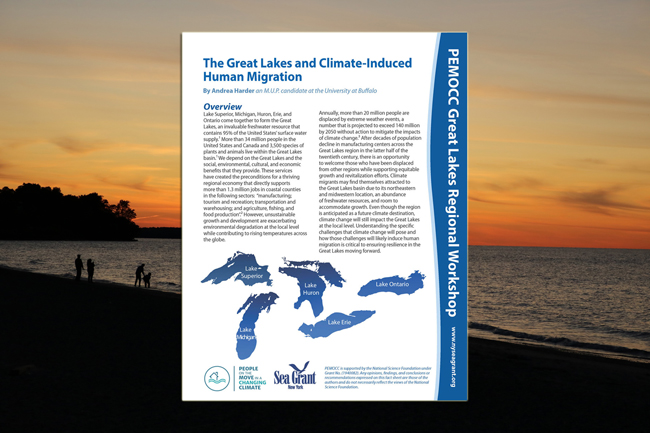
Kathy Bunting-Howarth, NYSG's Associate Director, E: keb264@cornell.edu, P: (607) 255-2832
NYSG is part of a national research collaboration consortium focused on climate-induced human migration
Ithaca, NY, March 23, 2023 - Climate change impacts coastal communities through flooding, storm surge, extreme weather (including drought), and sea level rise. These hazards may lead communities to relocate away from the coasts. Conversely, researchers have identified some areas of the United States as receiving areas for potential climate migrants. Despite increased reference to the link between climate change and human mobility (displacement, migration, planned relocation), there is a dearth of knowledge on how shifts in population patterns intersect with underlying socioeconomic, cultural, political, and environmental processes. Programs to empower communities to make decisions on relocation are lacking and there is a need to identify the resources that enable or constrain the ability of communities to relocate.
New York Sea Grant (NYSG) and other Sea Grant programs received funding from the National Science Foundation to develop a Research Coordination Network focused on climate-driven migration. The project named People on the Move in a Changing Climate (PEMOCC) is providing the scientific infrastructure that is required to conduct place-based, use-inspired collaborative research on climate-induced human mobility and regionally-tailored engagement strategies.
In June 2022, NYSG hosted and co-facilitated a PEMOCC workshop for the Great Lakes region in Buffalo, NY. The workshop featured the current state of knowledge on climate-induced human mobility, provided local/regional case studies, and addressed the unique needs of underserved and underrepresented coastal communities. Fifty participants from across the Great Lakes Basin states attended.
A “Great Lakes and Climate-Induced Human Migration” factsheet is now publicly available, prompting consideration of how climate change influence on human migration, displacement, and planned relocation may impact the Great Lakes region. A related presentation was made to the Erie County Climate Task Force.
Workshop outcomes that will help communities in the Great Lakes Basin and elsewhere move forward in their efforts to address climate-driven migration challenges and opportunities include:
1) data and research gap analyses,
2) a framework for conducting use-inspired research,
3) education and engagement needs for building community resilience and climate adaptation, and
4) a network of interdisciplinary and diverse researchers engaged in the study of climate-induced human mobility.
Partners:
• Andrea Harder
• University at Buffalo Master of Urban Planning student
• Pennsylvania, Ohio, Illinois-Indiana, Michigan, Wisconsin Sea Grants (Great Lakes)
• Georgia Sea Grant
Funding: National Science Foundation
More Info: New York Sea Grant
New York Sea Grant (NYSG), a cooperative program of Cornell University
and the State University of New York (SUNY), is one of 34 university-based
programs under the National Oceanic and Atmospheric Administration’s
National Sea Grant College Program.
Since 1971, NYSG has represented a statewide network of integrated
research, education and extension services promoting coastal community
economic vitality, environmental sustainability and citizen awareness
and understanding about the State’s marine and Great Lakes resources.
Through NYSG’s efforts, the combined talents of university scientists
and extension specialists help develop and transfer science-based
information to many coastal user groups—businesses and industries,
federal, state and local government decision-makers and agency managers,
educators, the media and the interested public.
The program maintains Great Lakes offices at Cornell University, SUNY
Buffalo, SUNY Oswego and the Wayne County Cooperative Extension office
in Newark. In the State's marine waters, NYSG has offices at Stony Brook
University in Long Island, Brooklyn College and Cornell Cooperative
Extension in NYC and Kingston in the Hudson Valley.
For updates on Sea Grant activities: www.nyseagrant.org has RSS, Facebook, Twitter, Instagram, and YouTube links. NYSG offers a free e-list sign up via www.nyseagrant.org/nycoastlines for its flagship publication, NY Coastlines/Currents, which is published quarterly.